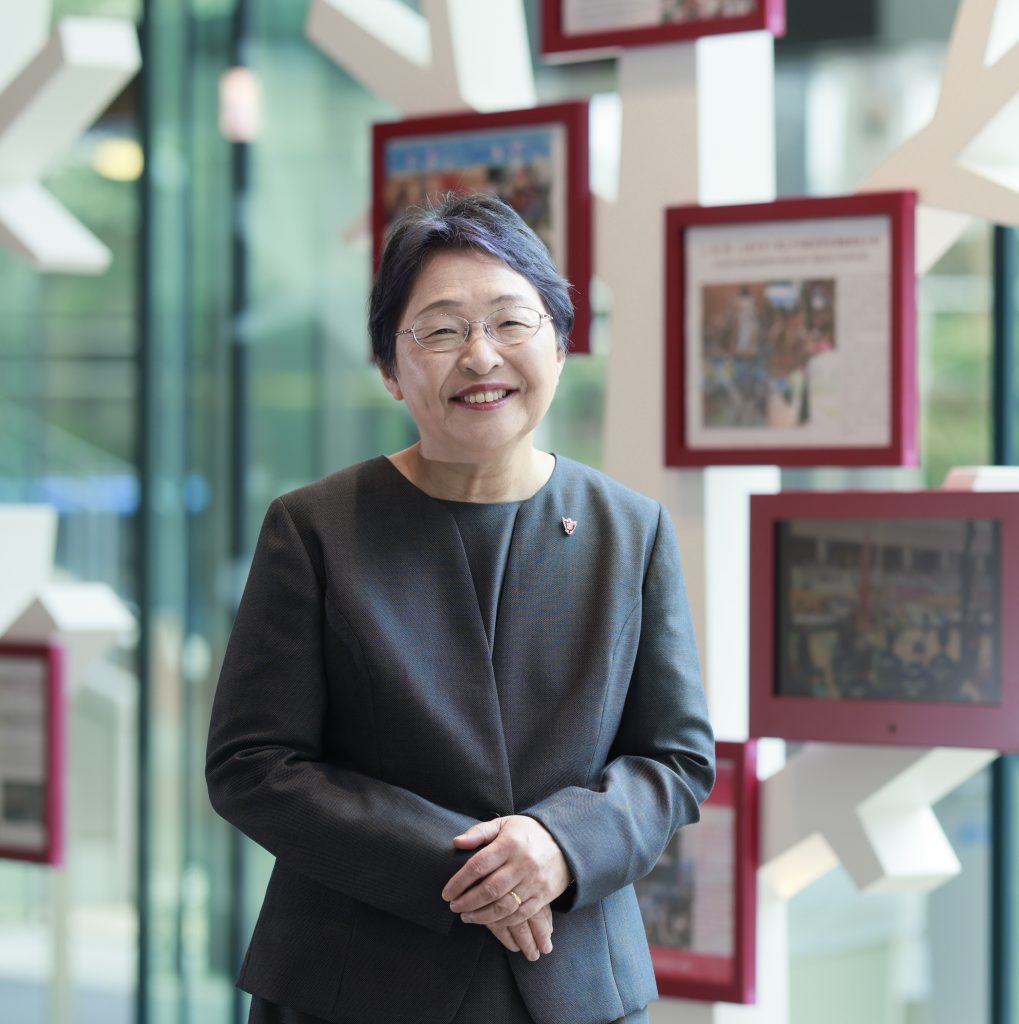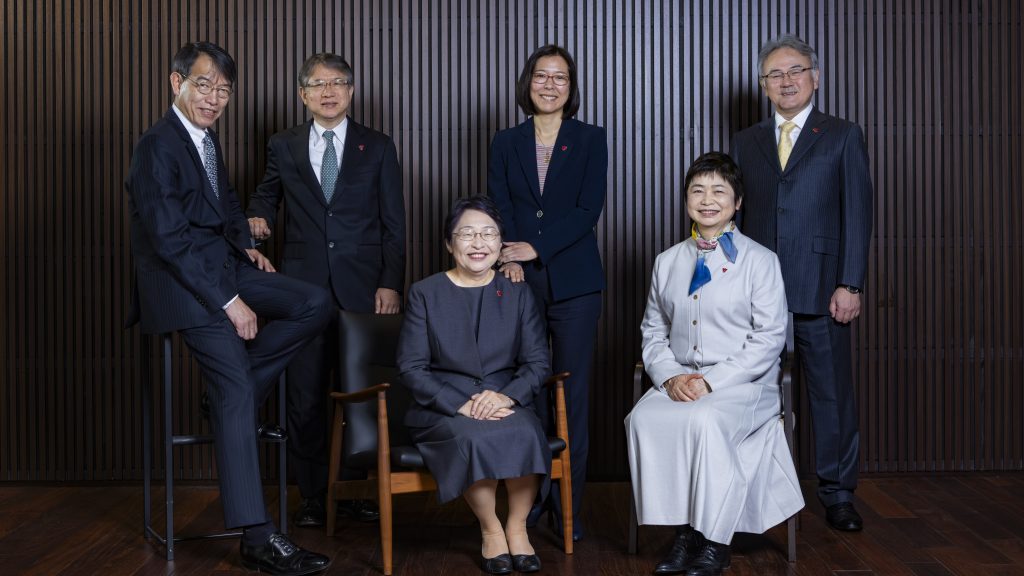Changing in Order to Stay the Same: The New President’s Pursuit of ‘Sophia-ness’

To date, the sixteen past presidents of Sophia University have each developed their own images of Sophia University and reflected it in their policies and management. What is the vision of ‘Sophia-ness’ imagined by President Sugimura, the university’s seventeenth leader? Below, she speaks about the three perspectives that define the university’s mission: ‘education,’ ‘research,’ and ‘social engagement.’
A Year to Reaffirm the Spirit We Have Inherited
In my first year as president, I wanted to return to our origins and reconsider what “Sophia-ness” truly means. Founded by the Catholic Jesuits, Sophia has always been rooted in the spirit of Christian humanism and guided by its founding philosophy of “bringing the world together.” While a university serves many roles, I wish to once again highlight this philosophy and make it the guiding principle for advancing reform.
To this end, the catchphrase developed among the vice presidents and me as we began working together was: “Changing in order to stay the same.” As times change, we strive to preserve the fundamental elements that have been woven through our history. Yet, if we simply stand still, what we have inherited will fade away. This phrase embodies the idea that while protecting what must be protected, we must also accept the changes required to develop, always maintaining our direction and guiding principles in sight as we take on new challenges.
Learning that Serves Others, Grounded in Diversity
When it comes to education, the qualities I would highlight as “Sophia-ness” are cosmopolitanism and neighborliness. We start from the premise of diversity—that countries hold different sets of values—and strive to stand alongside the “other,” including those in socially vulnerable positions. For example, if the theme is AI, Sophia’s education is not simply about pursuing technology itself. It also addresses the gap between those who can and cannot use AI, concerns about safety and rights protection, and the ethics and perspectives of the humans handling the technology. The aim is to consider what role AI should play in protecting human dignity.
The “Liberal Education and Learning (Kiban-Kyoiku)” courses, developed by the previous administration, embodies this very approach. It provides a framework through which students cultivate, over the course of their university life, the capacity to keep learning in order to adapt to changing times with competencies like human understanding, critical thinking, and problem-solving. Students learn to integrate these abilities into their own areas of expertise and in their pursuit of being helpful to others.
Our liberal arts education, led by the Faculty of Liberal Arts, as well as the Sophia Program for Sustainable Futures (an English-taught program offered across six departments that examines a sustainable future), reflect this same philosophy. While these programs are often recognized for being conducted in English, what truly distinguishes them is the way they use English—a globally accessible language—to facilitate cross-disciplinary learning and exposure to diverse perspectives. Similarly, the Department of Digital Green Technology, set to launch within the Faculty of Science and Technology in April 2027, aims not only to equip students with expertise in digital and environmental technologies but also to nurture individuals who can contribute to building sustainable frameworks for the international community.
Creating Opportunities for Researchers from Different Fields to Connect
If I were to express “Sophia-ness” in research with a single keyword, it would be interdisciplinarity. One of the distinctive features of the Yotsuya Campus is that a wide range of academic disciplines—such as humanities, social sciences and natural sciences—are concentrated in one place, with research labs from these different fields often located right next to each other. I look forward to the “chemical reactions” that emerge from this proximity.
To encourage encounters between faculty members from different disciplines, we are planning to create an internal research map. With so many researchers on campus, it can be difficult to have a clear view of each person’s fields of study. By visualizing who is researching what within the university, we hope to make it easier for people to connect upon their areas of interest.
In addition, we have launched an initiative to build a research community by organizing informal gatherings where researchers can bring their lunch and chat with one another on a regular basis. If people start taking an interest in each other’s research, sharing in passing for example that “that’s a topic Professor so-and-so is working on”—we can expect to see exciting collaborative projects take shape.
Carrying Forward a Spirit of Service Across Borders and Generations
In terms of social engagement, I believe Sophia’s hallmark is to act with openness and stand alongside society’s most vulnerable. A prime example is the Sophia Mission led by Professor Emeritus Yoshiaki Ishizawa (former president), who, during Cambodia’s civil war in the 1980s, traveled to the country to establish the Sophia Asia Center for Research and Human Development. For more than 30 years since, Sophia has supported efforts toward the conservation and restoration of Angkor Wat—undertaken “by Cambodians, for Cambodians.” In 2019, Sophia also established a company in Thailand, offering local tours and online programs not only for university students but also for middle and high school students, helping spark interest in social issues such as poverty and environmental challenges.
In Japan as well, Sophia has continually sought to open its learning to society rather than confining it within the campus. The university hosts a wide range of academic events accessible to the public, such as “United Nations Weeks,” “Africa Weeks,” and “Sophia Open Research Weeks.” Other initiatives include Professional Studies, launched in 2020 as an industry-academia program to foster globally applicable cultural literacy through partnerships with corporations, and the Sophia Global Citizen Program, introduced in 2024, which has drawn not only working adults and university students but also an unexpectedly high number of high school participants. In addition, the Institute of Grief Care educational programs contribute to building a healthy society where those experiencing grief can be supported with dignity.
Looking ahead, I hope to increase opportunities for our students to engage with those outside our university, bringing greater diversity across generations and disciplines into our campus.
In an age where knowledge and skills can be accessed online, the true value of attending a university lies in experiencing and internalizing its distinctive ethos, which is its stance and values. We at Sophia will continue to pursue a form of education, research, and social engagement that can only be experienced at our university.
